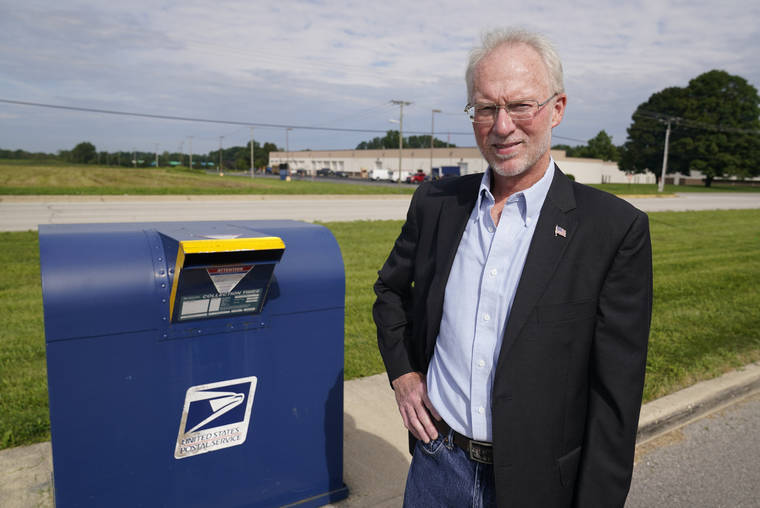The U.S. Postal Service is poised to play a central role in this year’s presidential elections, but some staffers are worried about the agency’s ability to deliver.
Controversial changes from the service’s new leader have left mail piling up in warehouses. Mail processing machines have been decommissioned. Overtime is being cut. The Postal Service has warned states that ballots might not arrive on time.
Meanwhile, President Donald Trump has acknowledged that he doesn’t want to provide the agency with extra money to undercut its ability to process what is expected to be a record number of mail-in ballots this fall. At the same time, his reelection campaign has legally challenged mail-in-voting in states that could decide the election.
“I’m very concerned as a postal worker that there could be delayed ballots because we’ve essentially been instructed to slow the mail down,” said Doug Brown, postal staffer and president of the American Postal Workers Union chapter in Indiana.
The agency’s new leader, Postmaster General Louis DeJoy, a major Trump donor, first moved to eliminate overtime and late delivery trips, stressing that the cost-cutting measures will make the service more profitable. Next, word went around that retail post offices were cutting business hours. Then, mail processing machines started getting dismantled, and the agency’s iconic blue mailboxes began to get removed from American streets.
The result is growing concern about the agency’s ability to deliver mail-in ballots in the upcoming presidential election.
“If we were left to do our jobs, they would get out on time,” Michael Cinelli, a postal truck driver and union shop steward in New York, said of mailed ballots.
The Postal Service’s board of governors tapped DeJoy to head the agency earlier this year, making the 63-year-old former supply-chain CEO the first postmaster general in nearly two decades who is not a career postal employee. Since taking over the service in June, DeJoy has instituted a series of operational changes that have delayed mail deliveries and infuriated members of Congress.
Memos obtained by The Associated Press show postal leadership has moved to halt overtime and late delivery trips that are sometimes needed to make sure mail arrives on time, with one document stating, “One aspect of these changes that may be difficult for employees is that — temporarily — we may see mail left behind or mail on the workroom floor or docks.”
The agency also is cutting retail post office hours, including on Saturdays and during lunch hours, according to records and postal workers. After an outcry, a Postal Service spokeswoman said the agency has paused for 90 days a plan to remove its blue curbside mail collection boxes. Additional documents obtained by the AP show the agency is moving to decommission nearly 700 mail processing machines across the U.S., reductions that several postal workers have confirmed and expressed worry about during interviews.
In Ohio, Daleo Freeman, a longtime postal worker and president of the Cleveland-area chapter of the American Postal Workers Union, said front-line staffers will do everything they can to deliver election mail on time but foresees “a battle” if current policies and delays continue.
“If we don’t have full participation in terms of the leadership down to the workers,” he said, “then we’re going to have problems with that mail, with those ballots.”
In a CNN interview over the weekend, Mark Meadows, the president’s chief of staff, said sorting machines will not be taken offline between now and the election
“I’ll give you that guarantee right now: The president of the United States is not going to interfere with anybody casting their vote in a legitimate way, whether it’s the post office or anything else,” Meadows said.
Election officials are readying for the possibility that half or more of American voters will vote by mail this November as the virus persists. Trump, without evidence, has repeatedly said mail voting will lead to widespread fraud as he worries that a spike in mail-in voting could cost him the election. He has publicly come out against Democratic efforts to provide emergency funding for the Postal Service, and his reelection campaign is involved in mail voting lawsuits in Pennsylvania, Iowa and Nevada.
Trump, in an interview last week with Fox Business Network, plainly said he is blocking money for the Postal Service to make it harder for the agency to process mail-in ballots.
“If we don’t make a deal, that means they don’t get the money,” said Trump, who has requested an absentee ballot in Florida. “That means they can’t have universal mail-in voting; they just can’t have it.”
Late last month, Thomas J. Marshall, the post office’s general counsel and executive vice president, sent states a letter warning that many of them have deadlines too tight to meet under the agency’s new delivery times.
The U.S. Postal Service Office of Inspector General, a federal watchdog, has opened an inquiry into the service’s policy changes after Sen. Elizabeth Warren and eight other Democrats sent a letter requesting a review, a spokeswoman said last week. On Monday, Rep. Ted Lieu, D-Calif., and Rep. Hakeem Jeffries, D-N.Y., asked the FBI to investigate whether DeJoy or members of the Postal Board of Governors may have committed a crime in slowing the mail.
———
Izaguirre reported from Charleston, West Virginia. The Associated Press produced this coverage with support from the Carnegie Corporation of New York.


